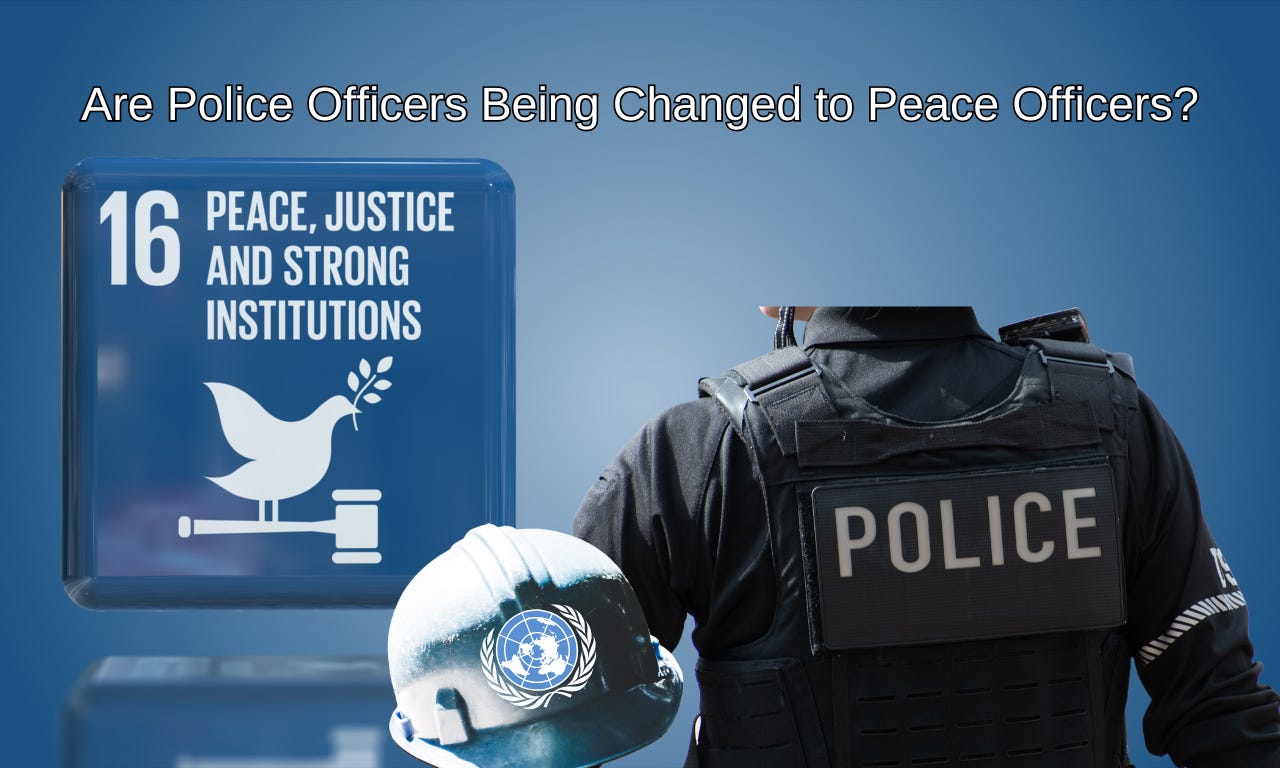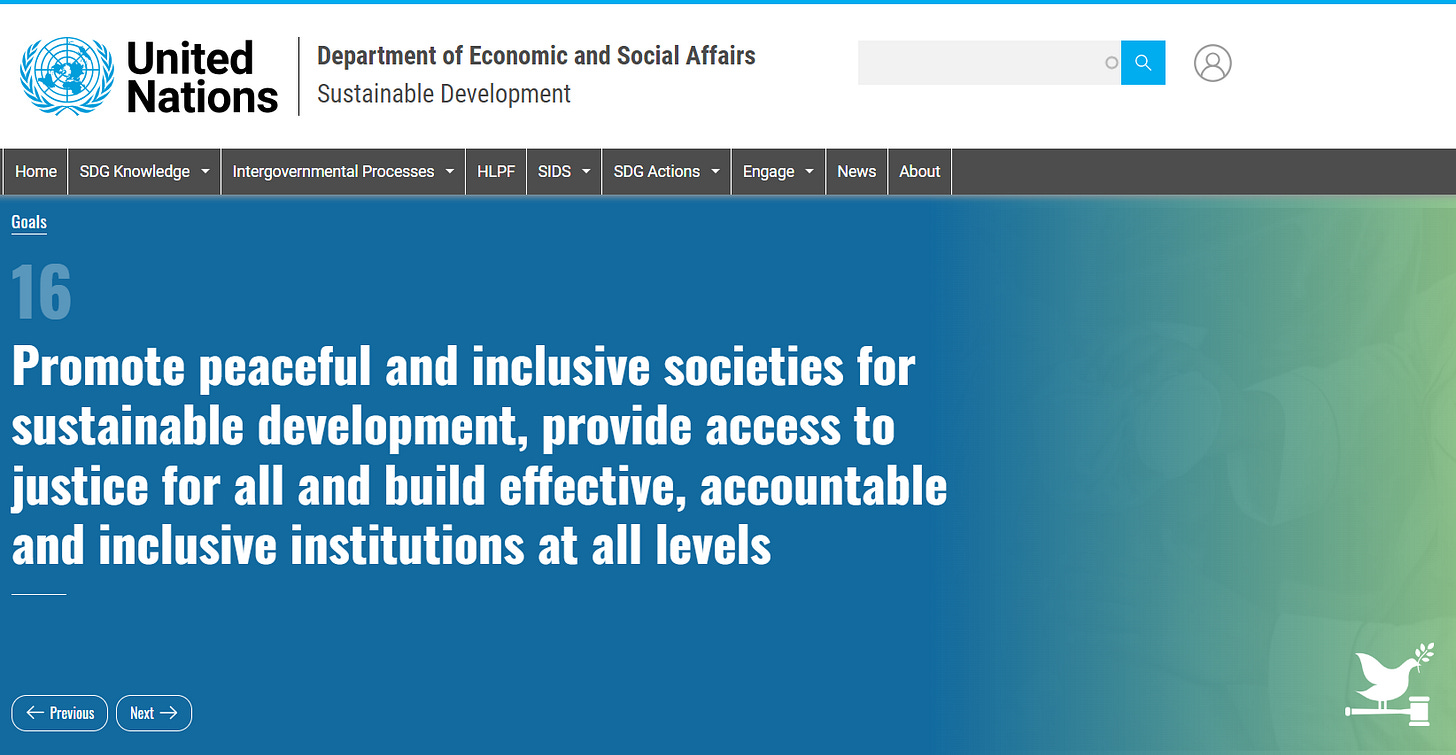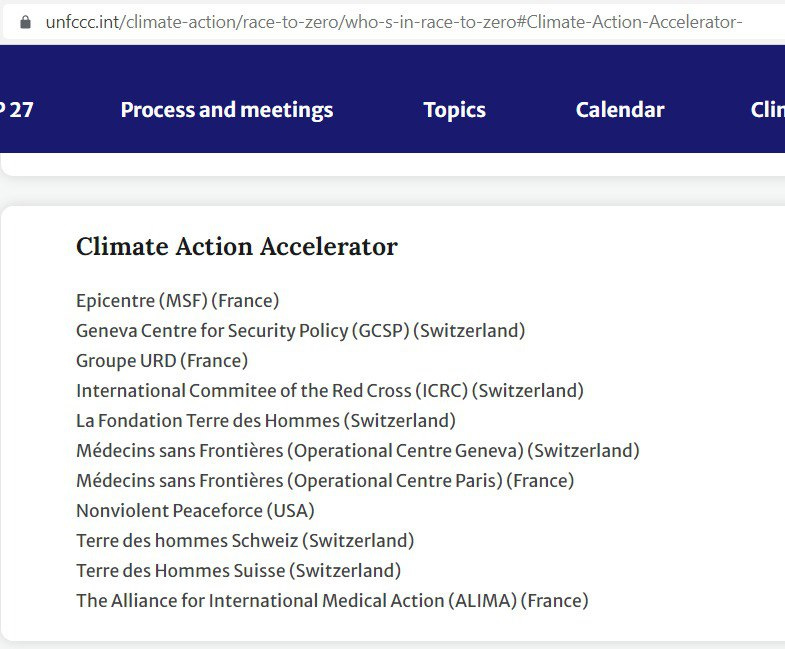Athena Jackson here. I wanted to alert people to something I am seeing in Utah, and I would imagine is likely happening all over the USA.
The term “peace officer” seems to be gradually replacing police officer in our code. I’ve been observing it for around 3 years now and at this point I have some very serious questions:
What is the different between police officer and peace officer?
Where did the term peace officer come from?
Why did Utah recently change it’s law to allow non-citizens to become police officers/peace officers?
What is the difference between police officer and peace officer?
Peace Officer vs Police Officer:
“The difference between a peace officer and a police officer is what each term refers to. A police officer must be a member of the police force. However, a peace officer can be a member of the police force, but they don’t have to be.
The differences end there but do continue on an individual career basis. Depending on the type of peace officer you become, there might be even more glaring differences. For example, if you become an arson investigator, you are a peace officer. This position is very different from a police officer." https://www.approvedcourse.com/peace-officer-vs-police-officer/
Sounds harmless enough, right? Well, I went and looked at some other sources just to verify what exactly a “peace officer” is. I found this one, and this one from a website about law enforcement.
“When applying for various law enforcement jobs the term “Peace Officer” may be used. While the term can vary from state to state it usually means a position that carries a badge, has the power to arrest, and also carries a firearm. A police officer, deputy sheriff, state trooper, and special agent all have the similarity of being peace officer positions. There is also the term “Sworn” which generally means sworn in as a peace officer. Federal law enforcement positions get their authority from federal law. However, many federal law enforcement positions are also recognized as peace officers under state law which gives the authority to enforcement state and local laws. When determining your law enforcement career path it is helpful to have an idea as to if you want to apply for sworn or non sworn positions.”
It still seems relatively benign right? This brought me to ask the question: Why would Utah want to change all this code from police officer over to peace officer if there is essentially no difference? What would be the point? There must be some reason. So I looked it up and what popped up as the first search result returned? Utah, or rather the U of U explaining the terminology. Then they went on to define it further here.
It goes on to explain that peace officer reminds them of how they are basically to engage with their entire community. Again this sounds harmless, and at least it gave some reason behind the name change. It still didn’t answer my question as to why the government would codify this change. I understand universities doing it, but why the government?
Then, I realized changing language matters, as the U of U says. There is a very clear reason they are changing police to peace officer. In a UTOPIA everyone would obey the “common good” rules and regulations. Everyone would- in a best case scenario - contribute, evolve and be happy. Worst case scenario - which I think is likely more accurate - however you decide, is a Stepford Wives situation. Individualism is erased, and I don’t mean the selfish narcissistic version, I mean, the ability to make choices for yourself. So, in short, who would be ENFORCING the new rules and regulations? How would they lull the people into the boiling pot? It would be via harmless language, joining a truth and a lie, through getting the people to demand removal of the “norms” and thus, a new norm takes it place.
This is an image I found on telegram about Utah Code. “Special Function Officer means a sworn in and certified peace officer performing specialized investigations, service of legal process, security functions, or specialized ordinance, rule, or regulatory functions.”
That sends off a LOT of alarm bells for me. One of my initial questions was, is this being used for those 86,000 plus IRS agents? Then, I started asking some bigger questions, like, can these peace officer positions be expanded to non-citizens or even citizens working with global groups?
Some links on Utah laws about non-citizens and law enforcement:
https://apnews.com/article/immigration-police-37be84ab5fa7c79f45a2d63a00cf62c5
This led me to an organization called Police2Peace
“Police2Peace is a national, nonpartisan, nonprofit corporation formed to redefine, reimagine and advance policing on a national scale through the framework of police officers as Peace Officers.”
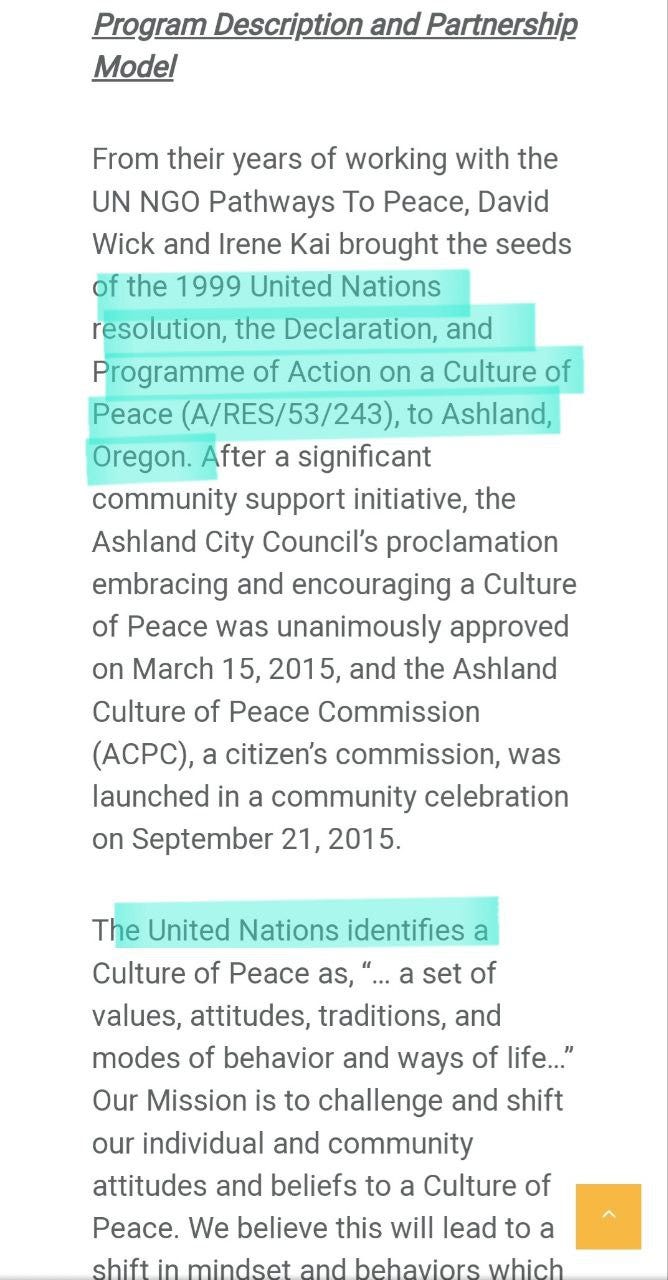
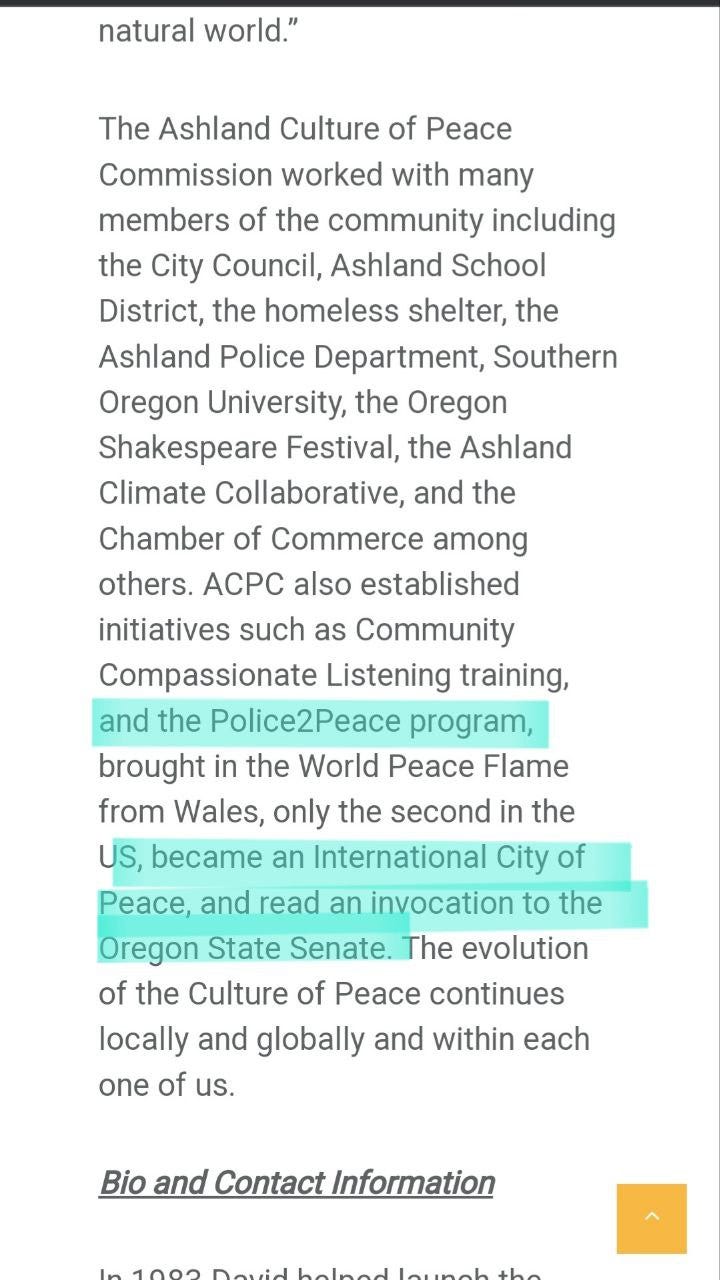
Source: https://pathwaystopeace.org/partnership-forum-2023/
This reminded me of what happened in Salt Lake City, UT back in 2019.
The United Nations held a “civil society” conference. Make sure you take in what kind of conference that was. With that knowledge let’s look at the United Nations goal number 16-Promote just, peaceful and inclusive societies.
Source: https://sdgs.un.org/goals/goal16
So what exactly does that mean? Well let’s pull directly from the UN: “Goal 16 is about promoting peaceful and inclusive societies, providing access to justice for all and building effective, accountable and inclusive institutions at all levels. People everywhere should be free of fear from all forms of violence and feel safe as they go about their lives whatever their ethnicity, faith or sexual orientation.” source: https://www.un.org/sustainabledevelopment/peace-justice/
To really hit home about what they are talking about here we have to go to a page they removed and thus can only be found archived.
“The 2018 edition of The Role of United Nations Police in Peace Operations translates current UN Police policies into practical and clear guidance that will help UN Police perform their mandated tasks in the field. The course covers the history of UN policing, including synopses of key documents, such as Security Council resolution 2185 on policing in UN peace operations and the report of the High-Level Independent Panel on Peace Operations, and offers an overview of the structure and reporting lines of the UN Police Division and a typical peace operation. Specific chapters cover the four key pillars of the Strategic Guidance Framework: Operations, Command and Control, Administration, and Capacity-Building. The course also examines gender mainstreaming efforts within UN Police; the unique security needs of women and children; cultural considerations; and the role of UNPOL in addressing sexual and gender-based violence, serious and organized crime, and partnerships with other State, regional, and international rule of law institutions. Eight lessons.”
I want to unpack that a bit. Think about what has been happening recently with free speech, or parents pushing back against the DEI and gender queer narrative. In the United Nations version of UTOPIA do you think you’ll be able to speak freely? Do you think you’ll be able to disagree with the “state?” How might they enforce this “just, peaceful, and inclusive" society? Would it be via peace officers or as they are sometimes called peace keepers? What exactly does the new slogan/campaign being used and pushed by the National Governors Association “Disagree Better” mean to you? How does this get enforced?
Does the below image look peaceful to you?
Source: https://peacekeeping.un.org/en
A picture is worth a thousand words as they say and the above does not make me feel like peace is their agenda.
Below is an image from the United Nations highlighting their “police division.” I have a question for all you readers, does this look like a peaceful operation? I have major concerns over their global reach. This seems like it would be in conflict with each country’s soverigenty. Police are enforcers of the law, or that is the general understanding across the world. Why would there be United Nations police division stationed in almost every country? Do all these country’s need help from the UN? Have all these country’s even asked for any help from the UN? How did these stations get approved in all these country’s? How did the ones in the United States get approved? Are there even some we don’t know about? In New York they recently found a police station operating with China connections. Is that not both a domestic and foreign threat?
source: https://police.un.org/en and https://peacekeeping.un.org/en/un-police
I think in Utah we all need to start asking why they are codifying the language change. Below are some bills for you to look at that changed from police to peace officer, or were/are promoting and pushing peace officer.
HB325 from 2022 did not pass, thank goodness but they have been slowly pushing this in various different bills the last few years.
https://le.utah.gov/~2022/bills/static/HB0325.html
2023 peace officer related bills
https://le.utah.gov/~2023/bills/static/HB0096.html
https://le.utah.gov/~2023/bills/static/SB0049.html
https://le.utah.gov/~2023/bills/static/HB0115.html
https://le.utah.gov/~2023/bills/static/HB0041.html
https://le.utah.gov/~2023/bills/static/HB0049.html
https://le.utah.gov/~2023/bills/static/HB0098.html
https://le.utah.gov/~2023/bills/static/SB0105.html
2024
https://le.utah.gov/~2024/bills/static/HB0177.html
Now, I think that gives enough examples to look through on peace officer language in Utah.
I want to point out another area of concern with the “peace officer” push. Free speech is the most obvious, but what about your 2A rights? There is a push to by the ATF to encroach further and further over our right to bare arms. What would a peace officer’s job be in this case? Or what about the almighty climate change?
You may or may not know the United States and Belgium are the policy makers for the Nonviolent Peaceforce. One would imagine them being involved in mental health policy, policing policy, criminal, and justice policy etc. Would you ever assume climate action as an area that needs a peaceforce? Well, apparently it is.
Now, I have to ask what would a peaceforce look like in relation to climate action? Is that forcing people to not idle their cars? Is it mandating certain areas be car free and enforcing that? Is it monitoring classrooms to make sure climate action is being taught? Is it monitoring water levels and rations to make sure no one is using more than what the state said was allowed? Seriously, what does this mean and/or look like?
I’d love to hear your thoughts.
In short, I wanted to ask you fellow researchers and free-thinkers: what is the reason for changing language from police officer to peace officer? Is it harmless? Is it just cleaning up code? Or, is there something else happening here?
I’ll leave that up to you to decide for yourself, but as for me personally, there is no reason to change the language unless there is a NEED to. Furthermore, I would like to know what that need is and why? Why the big push now? Utah has been playing with that terminology for a long time, so why the flood of peace officer changes after 2020?




